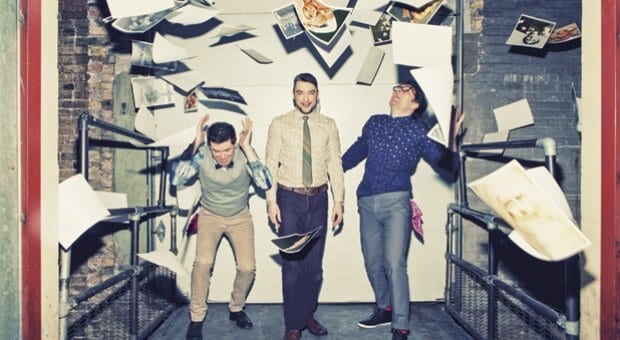Choosing The Gay Heritage Project as a title for their current theatrical offering wasn’t an act of laziness for creators Damien Atkins, Paul Dunn and Andrew Kushnir. Rather, it acknowledges the inherent complexities and problems in the monstrous task they’ve undertaken. Neither a comprehensive overview of queer identity through the ages nor a conclusive account of what it means to be gay today, the project is more a way for the creators to identify a lineage and situate themselves somewhere within it.
“There’s no word that accurately puts a finger on the people we’re looking for through history,” Atkins says. “‘Homosexual’ doesn’t go back far enough. ‘Queer’ isn’t a word everyone we’re looking at would identify with. We settled on ‘gay’ because it’s the word we use in our own lives, and we started this exploration from a personal place because that’s what we know best.”
“Using the word heritage meant we also had to use the word project in recognition that it’s ongoing and ever-evolving,” Dunn adds. “We’ve come to embrace heritage as an activity, rather than simply a concept.”
The work’s earliest flickerings developed during another theatrical process: Hannah Moscovitch’s East of Berlin. Cast to play the gay son of a Nazi war criminal in the show, Dunn decided to research the treatment of homosexuals under the Third Reich and came upon Heinz Heger’s 1980 book The Men with the Pink Triangle.
“I was viscerally surprised by the amount of outrage it awoke in me,” Dunn says. “Maybe because it was in the context of theatrical research, my first impulse was to connect with these guys to make something.”
For their part, Atkins and Kushnir had early reservations.
“I was curious but not propelled the way Paul was,” Atkins admits. “But all these years later, the work feels incredibly vital and indispensable to my life.”
“I wasn’t terribly excited, originally,” Kushnir adds. “I’ve never met another gay Ukrainian-Canadian, and trying to search out some rich history I wasn’t convinced existed only underlined how alone I was. What became enticing was the act of imagination in exploring the ways we’re connected to other gay people. It was also important that we’re openly gay artists who are interested in talking about that. It’s not a footnote to our creative identities. It’s part of our marrow.”
The research process, aided extensively by dramaturge Paul Halferty, included scouring libraries and archives and interviewing local and international community members knowledgeable about the subject matter. Working in a community spirit, they also set up a booth during Pride, inviting passersby to share their thoughts on the subject. They then began developing material using vocal masque, a highly athletic and playful form of performance storytelling. After creating nearly four hours of content, they began the task of chiselling it down to a neat 90 minutes. The result is a collage of overlapping scenes, where each performer plays numerous characters.
They step into The Wizard of Oz, put the HIV virus on trial and interview Peter Worthington, the now-deceased journalist who helmed the Toronto Sun during the 1981 Toronto bathhouse raids. They have a dialogue with a man in a concentration camp, perform an excerpt from Brian Orser’s 1987 World Championship–winning long program and impersonate Margaret Atwood.
So how do they go from an admittedly incomplete list of gay history bullet points to a meaningful definition of gay heritage? The answer is fuzzy but depends on relating history to the present moment as well as the future of the community.
“History includes facts, dates and events,” Dunn says. “You can put them on paper but not necessarily know how it connects to you. Heritage is the process of making this personal.”
“History can be very disappointing because you’re left feeling that gay people like us, the ones who’ve formed an identity around their desire, haven’t existed for that long,” Kushnir adds. “But there’s still a kind of gay soul you can look for, which may not be anchored in those events but is still valid.”
If any conclusion can be reached, it’s that there is rising interest in the subject; they point to recent productions of seminal gay works The Normal Heart and Angels in America, as well as the explosion of websites dedicated to the theme.
“This play doesn’t give any absolutes about whether gay heritage concretely exists,” Kushnir says. “But what resonates with me is defending the right to search it. When you feel like you don’t even have that possibility, that’s what becomes truly problematic.”
The Gay Heritage Project
Sun, Nov 17–Sun, Dec 8
Buddies in Bad Times Theatre 12 Alexander St
buddiesinbadtimes.com


 Why you can trust Xtra
Why you can trust Xtra


